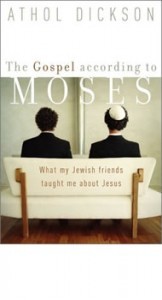After he spent five years attending Chever Torah, Athol Dickson found his faith radically changed-the result being a deeper relationship with God. In beautiful and simple language, The Gospel according to Moses illustrates Dickson’s journey of faith exploring some of the primary theological differences and similarities between Christianity and Judaism. He draws generously on both Old and New Testament scriptures, looking at Christian and Jewish perspectives on topics such as suffering, grace vs. works, and the place of Jesus in the Hebrew Scriptures.
“Dickson is endearing in his enthusiasm for learning, and he encourages Christians to explore their Jewish roots as a way to grow in their faith.” – Christianity Today
“So what has Dickson taken away from his studies at Chever Torah? ‘Strange as it may seem,’ he writes, ‘the Jewish perspective of Chever Torah had given me a richer, more solid foundation for my own faith.’ That’s a perspective evangelicals who’ve had any contact with Judaism or Israel can resonate with.” – Books and Culture
